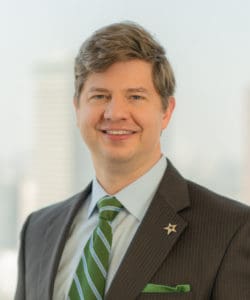On July 8, 2024, Hurricane Beryl made land fall as a Category 1 hurricane that would become the costliest storm to hit Texas since Hurricane Harvey in 2017. Beryl produced extreme winds that wreaked havoc on trees, power lines, and infrastructure leaving millions of Texans without power. More than 900,000 power outages occurred in Harris County alone with many outages lasting well over a week. Given this major weather event, it is a good time to review the law of force majeure for the purposes of construction contracts.
The term “force majeure” dates back more than a century and refers to an event, such as an “Act of God”, beyond the parties’ reasonable control that intervenes to create a contractual impossibility and thereby excuse performance. In order for supervening circumstances to excuse performance the contractor must prove that it was physically impossible to perform the contractual obligations and not merely that events had rendered performance more expensive. Additionally, impossibility is not an excuse for nonperformance where it might have been reasonably foreseen or guarded against in the contract even though the impossibility results from an Act of God over which the parties had no control.
Much of the historical underpinnings have fallen by the wayside over the course of the past hundred years. Today, the term force majeure does not have much inherent substance. Its scope and application is, for the most part, utterly dependent on the terms of the contract. Texas courts have found that the scope and application of a force majeure clause is utterly dependent on the terms. “[W]hen the parties have themselves defined the contours of the force majeure in their agreement, those contours dictate the application, effect, and scope of force majeure.” Sun Operating Ltd. Partnership v. Holt, 984 S.W.2d 277, 282–83 (Tex.App. Amarillo,1998) & Texas City Ref., Inc. v. Conoco, Inc., 767 S.W.2d 183, 186 (Tex.App.—Houston [14th Dist.] 1989, writ denied).
The best practice is to include a laundry list of events that would discharge performance under the theory of force majeure, rather than using the phrase force majeure as a “catch all” provision. This also eliminates the prong of whether the event was unforeseeable. The Fifth Circuit has established that when parties specify certain force majeure events, “there is no need to show that the occurrence of such an event was unforeseeable.” Perlman v. Pioneer Ltd. P’ship, 918 F.2d 1244, 1247–48 (5th Cir. 1990). When the allege force majeure event is not specifically listed in the contract, and the event is alleged to fall within the general terms of a catch all force majeure provision, it is unclear whether a party has contemplated and voluntarily assumed the risk. TEC Olmos, LLC v. ConocoPhillips Company, 555 S.W.3d 176, 183–85 (Tex.App.-Hous. (1 Dist.), 2018). In such instances, the court will apply a common-law definition of force majeure including unforseeability to “fill in the gaps” in the force majeure clause.
Debilitating weather events in the gulf coast of Texas are becoming more common. These events can lead to substantial delays on a construction project. As a result, it is paramount for the contractor to not only have a force majeure clause in the construction contract, but to specify these sort of extreme weather events in the contract. Simply relying on phrases like force majeure or Act of God are no longer sufficient to relieve the contractor of performance when a bad storm hits.

Francis D. McWilliams IV is a native Houstonian with proven courtroom experience in both civil and criminal courts. Francis routinely represents general contractors, subcontractors, manufacturers, developers, insurance companies, owners and individuals in complex litigation, insurance defense and worksite accidents. Known for his “straight talk” communication style, Francis is a strategic legal advisor to his clients that prioritizes their business objectives.